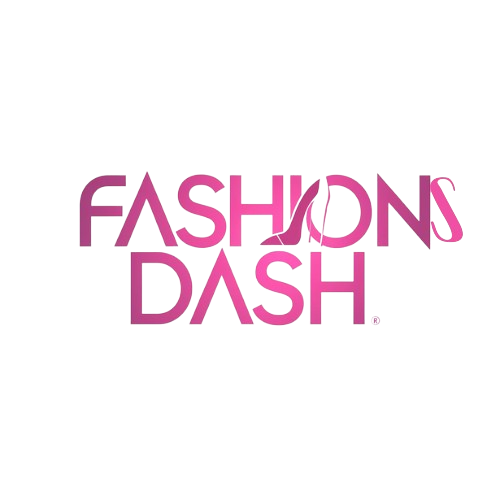Zara, the fashion juggernaut, has an almost omnipresent global footprint with over 3,000 stores in 96 countries.
In fact, the term “fast fashion” was coined by the New York Times in the 1990s specifically to describe Zara’s business model of taking designs from concept to stores in a mere two weeks at affordable fashion prices.
With annual sales surpassing $35 billion and a staggering 450-800 million units moved per year, Zara’s global presence as the flagship brand of parent company Inditex is undeniable. But at what cost does such rapid, mass production come? Let’s strut the catwalk of truth about Zara’s real record on sustainability.
Let’s Strut The Catwalk Of Truth About Zara Sustainability
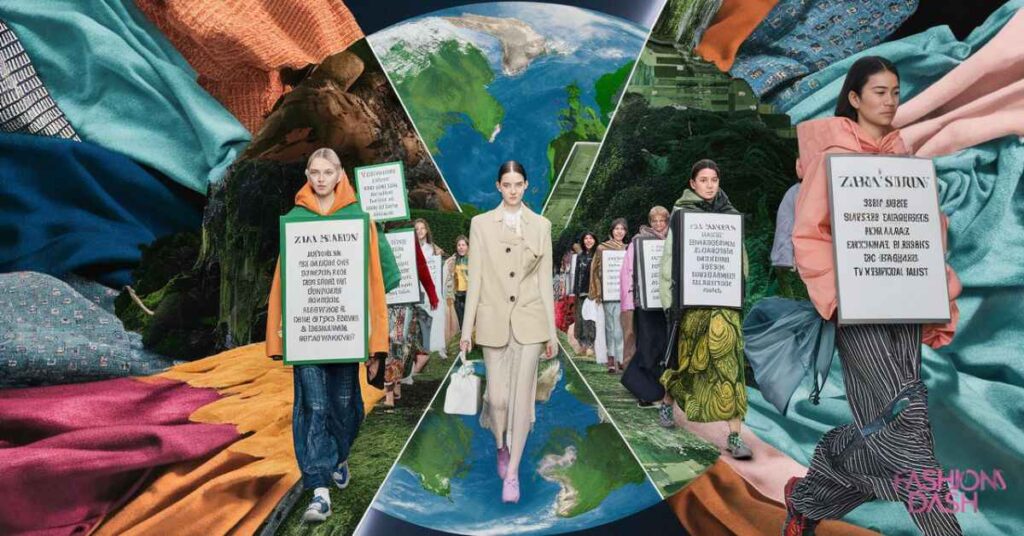
While Zara presents a polished, premium image, a deeper look reveals a controversial history and concerning practices that make consumers question – is Zara actually a sustainable and ethical brand? Despite lofty pledges, Zara’s ethical issues and sustainability issues come under fire from watchdog groups like Fashion Revolution. In their annual Fashion Transparency Index report, Zara scored a measly 1% for supply chain traceability despite a 90% rating on policies and commitments – a discrepancy that warrants examination.
1. Uncovering Why Zara Is Fast Fashion
The fast fashion model that Zara pioneered is defined by.
Read This Blog: HOW TO BECOME A FASHION DESIGNER
- Obscene volumes of clothing produced at lightning speeds
- Rock-bottom pricing made possible by cutting ethical corners
- Copying designs from other brands and indie artists (design theft)
- Using cheap, toxic materials like polyester that are hazardous for the planet and human health
- Relying on abusive production lines with poverty wages, harassment, and unsafe conditions
So while Zara exudes sophistication, the brand undoubtedly fits the fast fashion mold of unsustainable overproduction. Let’s dive into the controversies tarnishing Zara’s reputation.
2. Zara Controversies
A simple online search reveals a litany of Zara controversies.
Zara & Gaza Controversy
The #The BoycottZara movement exploded after an ill-conceived ad campaign depicted a model carrying what looked like a white body bag surrounded by rubble, sparking comparisons to the violence in Gaza. Global protests and vandalism of Zara stores ensued over the perceived mocking of Palestinian suffering.
Wage Theft Scandals
Zara workers have sewed desperate pleas for help into clothing due to unpaid wages, including a potential $50 million wage theft via Indian supply chains also used by H&M and Nike – which would be the largest in fashion history if proven true.
Sweatshop Labor Uncovered
Investigations have repeatedly uncovered appalling working conditions and modern slave labor at Zara suppliers, such as a 2011 Brazilian factory where a 14-year-old child and other workers faced slave-like conditions despite Zara’s zero tolerance policy.
Greenwashing Exposed
Major environmental groups like Greenpeace have accused Zara of greenwashing through vague sustainability claims, lack of verification, and continued reliance on blended synthetics instead of truly eco-friendly materials.
Design Piracy
Over just a three-year period from 2015-2017, Zara faced over 40 reported cases of blatantly copying designs from independent artists without credit or compensation.
Offensive & Racist Products
From launching children’s clothes reminiscent of concentration camp uniforms to banning designers due to racist Instagram messages, Zara has a track record of product controversies rooted in insensitivity.
Use of Hazardous Chemicals
A decade ago, Greenpeace revealed hazardous chemical dyes in Zara clothing that could break down into cancer-causing substances, though Zara pledged to remove toxins by 2020 (with no proof yet).
3. Zara Ethical Issues
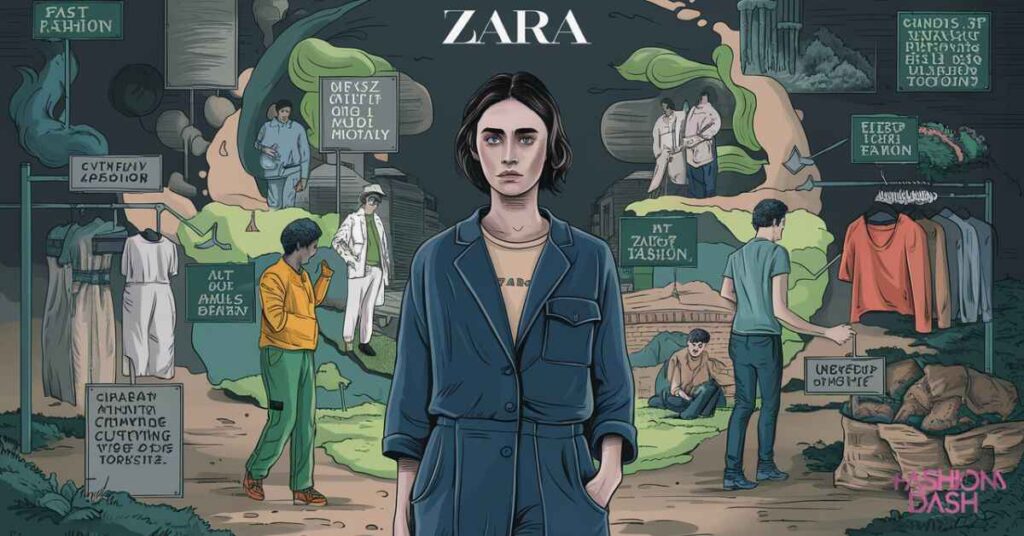
Beyond the controversies, Zara’s core business practices are fraught with ethical lapses.
Unethical Labor
Despite codes of conduct banning issues like child labor, virtually no progress ensuring a living wage is evident per Fashion Checkers supply chain assessments. From unpaid workers and harassment to discrimination and abysmal conditions, numerous reports reveal the unethical labor practices behind Zara’s low prices.
Also Read This Blog: HOW MUCH DOES FULL BODY LASER HAIR REMOVAL COST
Animal Welfare Concerns
While Zara claims animal products must come from ethical, responsible sources adhering to animal welfare standards, the critical lack of traceability and third-party certification means there is no way to verify these claims about ethical wool, leather, down, or exotic hair.
Supply Chain Opacity
A key reason watchdog groups give Zara’s ethical labor and operations such dismal ratings is the distressing lack of transparency and public disclosure about where its products are made and by whom.
4. Zara Sustainability Issues
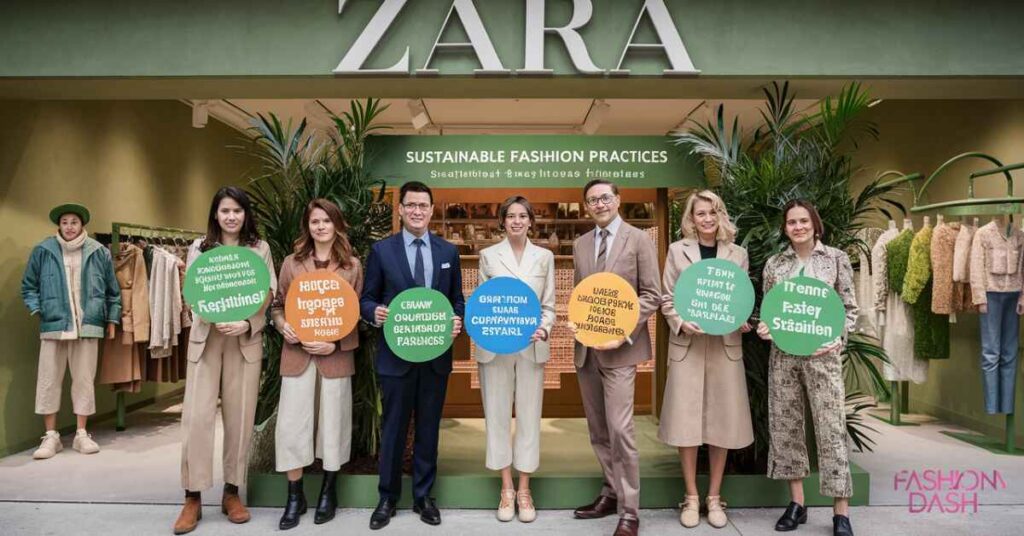
Over the years, Zara has made sweeping sustainability pledges like.
- Removing all hazardous chemicals by 2020
- Using only sustainable materials by 2025
- Achieving carbon neutrality as part of the Join Life sustainable collection
- Robust initiatives around textile waste management and circularity
However, tangible proof and audits validating these claims are severely lacking, allowing critics to cry “greenwashing” Some key areas of concern.
Virgin Synthetic Reliance
The vast majority of Zara collections still use virgin polyester, nylon and other synthetic fabrics derived from fossil fuels, which contribute massively to climate change, microplastic pollution, and the environmental impact of fashion production.
Minimal Progress on Sustainable Materials
Despite pledges, organic cotton, recycled synthetics and other legitimately sustainable fabrics certified by third parties remain a tiny fraction of what Zara uses. Simply using slightly “better” materials does not equate to sustainability.
Greenwashed Circularity Claims
While Zara promotes circularity through its “Pre-Owned” platform for repair services and recycling old clothes, these efforts are small-scale while it continues churning out millions of new, disposable garments made from unsustainable materials.
Lack of hard data and verification
Perhaps most damningly, Zara does not provide transparent, verified data to show it is actually reducing hazardous chemical discharges, achieving emissions reductions, paying living wages, remediating pollution incidents, or shifting towards an authentically circular model. Its commitments are simply words without receipts.
Did you know we Have a Newsletter?
Stay up-to-date on the latest ethical fashion news and sustainable living tips! Subscribe to our weekly newsletter using the form below for exclusive content.
Final Thoughts On Zara Labor Practices & Sustainability
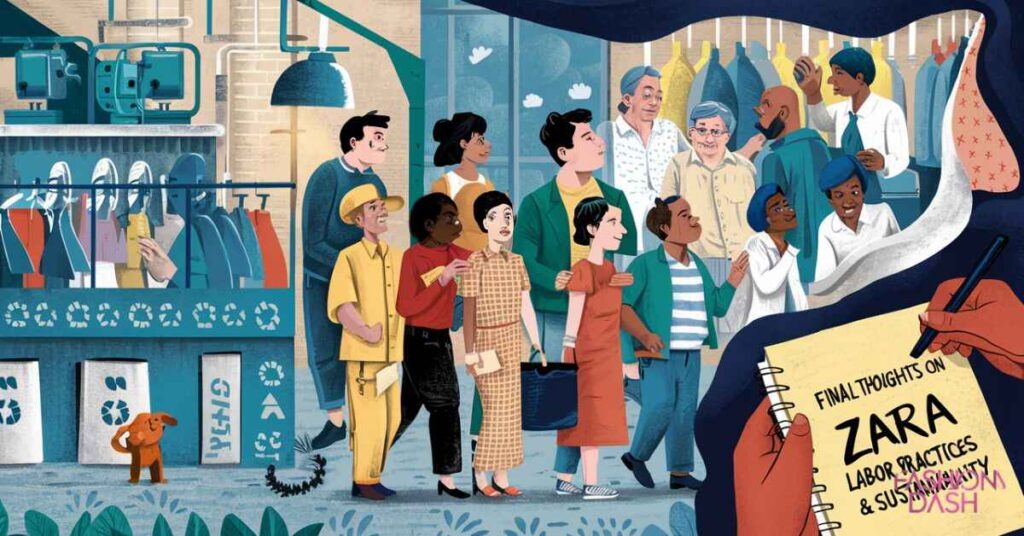
The evidence painted by investigations, reports, and advocacy groups demonstrates that despite periodic sustainability claims, Zara upholds many unethical labor practices and environmentally destructive production processes tied to the fast fashion model it pioneered.
From wage theft, harassment, and life-threatening conditions for supply chain workers (many of whom are women intentionally hired due to systemic oppression) to overreliance on cheap synthetics, lack of progress towards ethical materials, and unsubstantiated greenwashing – it is clear Zara still prioritizes maximizing profits through volume over genuine sustainability progress.
While the fashion giant has taken some positive strides in outlining policies, commitments, and initiatives, it continues selling over 450 million units annually using an opaque, linear system rife with human rights and environmental abuses. Tangible proof and third-party validated data on achieving targets is desperately needed.
Ultimately, until the unsustainable core of Zara’s fast fashion model shifts towards radical transparency, investment in ethical materials and living wages, and a legitimately circular system that does not over-produce disposable goods – it cannot be considered a leader in sustainability or ethical manufacturing. For now, it remains emblematic of fast fashion’s most harmful attributes.
That said, Zara is not the only unethical fast fashion offender to avoid. Other concerning brands that promote overproduction and unethical practices include.
Here is a continuation with more fast fashion brands to avoid and additional related sections.
The Cheap & Dirty: 9 Fast Fashion Brands To Avoid
- Shein
- Fashion Nova
- Forever 21
- H&M
- Gap
- Victoria’s Secret
- Primark
- Boohoo
- Missguided
These fast fashion retailers have been repeatedly called out for unethical manufacturing, supply chain abuses, environmental violations, greenwashing, and fueling overconsumption through their rapid production of cheap, disposable garments.
Is PacSun Fast Fashion?

PacSun (Pacific Sunwear) is considered by most ethics watchdogs to be a fast fashion brand due to.
- Reliance on overseas sweatshop labor with poor wages and conditions
- Frequent accusations of copied designs from indie artists
- Heavy use of synthetic, non-biodegradable fabrics like polyester
- Extremely rapid production cycles and encouragement of overconsumption
- Lack of transparency around environmental and social policies/commitments
While PacSun has made some halfhearted attempts at greenwashing through eco-conscious marketing, their core business model aligns with the unethical fast fashion industry.
What is Rayon Fabric & Is It Sustainable?
Rayon is a semi-synthetic cellulose fiber made from wood pulp. While marketed as being derived from natural materials, the harsh chemical processing required raises sustainability concerns.
- Releases toxic chemicals like caustic soda and carbon disulfide
- Contributes to deforestation when sourced from ancient forests
- Requires intensive water and energy use in production
- Does not break down easily in landfills or oceans
More sustainable alternatives to conventional rayon include:
- Bamboo rayon/viscose using a closed-loop system
- Tencel lyocell produced in an environmentally-friendly process
- Plant-based fabrics like organic cotton, linen or hemp
While not synthetic, rayon produced through typical methods has a significant environmental footprint compared to truly sustainable natural fibers.
Frequently Asked Question
What defines fast fashion?
Fast fashion refers to the rapid production of trendy clothing at affordable prices, often associated with quick turnover and frequent releases.
Is Zara considered a fast fashion brand?
Yes, Zara is widely recognized as a leading fast fashion retailer, known for its ability to quickly respond to fashion trends and bring new styles to market.
How does Zara maintain its fast fashion status?
Zara achieves its fast fashion reputation through vertically integrated operations, enabling swift design, production, and distribution processes.
Are there sustainability concerns with Zara’s fast fashion model?
Zara has faced criticism for aspects of its fast fashion practices, including concerns over environmental impact and labor conditions in its supply chain.
Does Zara prioritize sustainability alongside its fast fashion approach?
While Zara has implemented some sustainability initiatives, balancing environmental and social concerns with its fast fashion business model remains a complex challenge.
Does Zara’s fast fashion model influence consumer behavior?
Zara’s fast fashion strategy often leads to frequent purchases by consumers seeking the latest trends, contributing to a culture of disposable fashion.
How does Zara’s fast fashion model impact the fashion industry?
Zara’s fast fashion approach has influenced industry standards, prompting competitors to adopt similar strategies to keep pace with rapidly changing consumer demands.
Can consumers make ethical choices when shopping at Zara?
While Zara’s fast fashion model presents challenges, consumers can make more sustainable choices by opting for quality over quantity and supporting brands with transparent supply chains.
Conclusion
Zara undeniably operates within the realm of fast fashion, characterized by its swift response to trends, rapid production cycles, and affordability. Its vertically integrated supply chain facilitates the quick turnaround of new designs, contributing to its status as a leader in the fast fashion industry.
However, this model raises significant sustainability and ethical concerns, including environmental impact and labor practices. While Zara has made efforts to address these issues through sustainability initiatives, the fundamental tension between fast fashion and responsible consumption persists. Ultimately, consumers play a crucial role in shaping the future of fashion by making informed choices and advocating for transparency and accountability throughout the industry.
